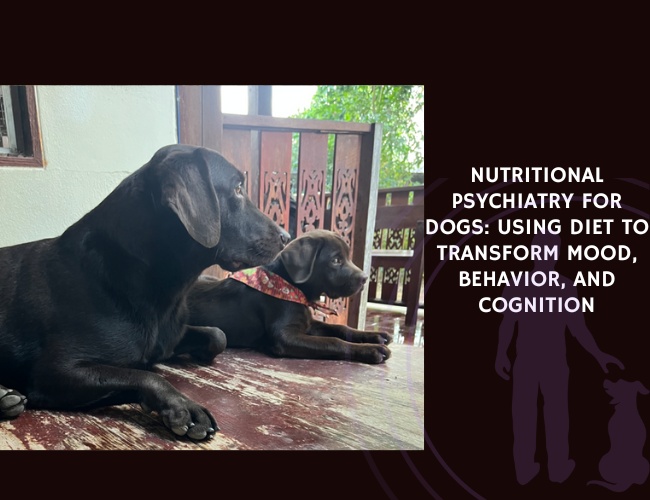Introduction: The Food-Mood Connection in Your Canine Companion
Have you ever noticed how your dog’s behavior seems to shift after certain meals? That post-dinner zoomie session or the unusual calm after breakfast isn’t just coincidence—it’s nutritional psychiatry in action. Just as we’re discovering the profound impact of diet on human mental health, groundbreaking research reveals that what fills your dog’s bowl directly influences their emotional stability, cognitive sharpness, and behavioral patterns.
The emerging field of nutritional psychiatry for dogs explores this fascinating intersection where kibble meets consciousness, where amino acids influence anxiety, and where the gut quite literally talks to the brain. This isn’t just about keeping your furry friend physically healthy anymore—it’s about nourishing their mind, stabilizing their mood, and potentially transforming challenging behaviors through strategic dietary choices.
Let us guide you through this revolutionary approach to canine wellness, where every meal becomes an opportunity to support your dog’s mental and emotional wellbeing. Whether you’re dealing with an anxious rescue, a reactive guardian breed, or simply want to optimize your companion’s cognitive health as they age, understanding the diet-brain connection will fundamentally change how you approach your dog’s nutrition. 🧠
The Gut-Brain Axis: Your Dog’s Second Brain at Work
Understanding the Canine Microbiome-Mind Connection
Deep within your dog’s digestive system lives a bustling metropolis of microorganisms—trillions of bacteria, fungi, and other microbes that do far more than just process food. This gut microbiome acts as your dog’s “second brain,” constantly communicating with the actual brain through what scientists call the gut-brain axis. It’s a superhighway of neural, hormonal, and immune signals that profoundly influences how your dog thinks, feels, and behaves.
When this microbial community thrives in balance, your dog experiences emotional stability, sharp cognition, and resilient stress responses. But when dysbiosis occurs—an imbalance in these gut residents—the effects ripple through to the brain, potentially triggering anxiety, aggression, or cognitive fog. Research shows that altered microbial diversity directly correlates with behavioral disturbances in dogs, from separation anxiety to unprovoked reactivity.
The communication happens through multiple fascinating pathways. Gut bacteria produce neurotransmitters like serotonin (yes, the same “happiness chemical” we talk about in humans), while also influencing inflammation levels that can affect mood regulation. They even produce short-chain fatty acids that serve as fuel for brain cells and help maintain the blood-brain barrier’s integrity.
The Inflammation-Behavior Link You Need to Know
Chronic inflammation isn’t just about achy joints or digestive upset—it’s increasingly recognized as a hidden driver of behavioral issues in dogs. When the gut microbiome becomes imbalanced, it can trigger systemic inflammation that reaches the brain, creating what researchers call “neuroinflammation.” This inflammatory state has been directly linked to increased anxiety, depression-like symptoms, and even aggressive tendencies in our canine companions.
Think of it this way: inflammation is like static on a phone line between the gut and brain. Messages get distorted, leading to inappropriate behavioral responses. Your normally gentle Golden Retriever might become unexpectedly snappy, or your confident German Shepherd might develop sudden anxiety around everyday situations. The good news? Dietary interventions that reduce inflammation can clear up this static, restoring clear communication and balanced behavior.
Mood Regulation Through Strategic Nutrition
Amino Acids: The Building Blocks of Emotional Balance
Every time your dog takes a bite of their food, they’re consuming amino acids that directly influence their emotional state. Tryptophan, found in turkey, eggs, and certain fish, serves as the precursor to serotonin—that crucial neurotransmitter governing mood, sleep, and impulse control. Without adequate tryptophan, your dog’s brain simply can’t produce enough serotonin, potentially leading to anxiety, aggression, or compulsive behaviors.
But here’s where it gets interesting: the relationship between protein and behavior isn’t straightforward. Recent studies in Golden Retrievers revealed that dogs fed high-protein diets (≥30%) were 1.3 times more likely to exhibit dog rivalry compared to those on medium-protein diets. This suggests that for some dogs, especially those prone to dominance-related aggression, moderating protein intake while ensuring adequate tryptophan might be key to behavioral stability.
The trick lies in finding your individual dog’s sweet spot. Working breeds processing high-energy demands might thrive on higher protein, while anxious or reactive dogs might benefit from moderate protein with strategic tryptophan supplementation. This personalized approach to amino acid balance represents the cutting edge of behavioral nutrition.
Omega-3 Fatty Acids: Nature’s Anxiety Antidote
Those shiny fish oil capsules you might add to your dog’s dinner do more than promote a glossy coat—they’re powerful modulators of brain health and emotional resilience. Omega-3 fatty acids, particularly DHA (docosahexaenoic acid) and EPA (eicosapentaenoic acid), integrate directly into brain cell membranes, influencing everything from neurotransmitter function to inflammatory responses.
Research demonstrates that dogs with higher omega-3 levels show improved stress resilience, reduced anxiety-related behaviors, and better cognitive performance. These fatty acids work by reducing neuroinflammation, supporting healthy neurotransmitter production, and maintaining the flexibility of neural connections. For anxious dogs, think of omega-3s as a buffer against stress—they don’t eliminate challenges but help your dog’s brain respond more appropriately.
The source matters too. While plant-based omega-3s from flaxseed have their place, marine-sourced omega-3s from fish oil or algae provide the DHA and EPA forms that the brain can readily use. For dogs with noise phobias, separation anxiety, or general nervousness, incorporating quality omega-3 sources might provide that extra emotional cushion they need to navigate daily stressors.
Carbohydrate Quality: The Overlooked Mood Stabilizer
While the dog food industry often focuses on protein content, the quality and type of carbohydrates in your dog’s diet play a surprisingly crucial role in emotional stability. Complex carbohydrates from sources like sweet potatoes, oats, and quinoa provide steady glucose release, maintaining stable blood sugar levels that directly impact mood and behavior.
Consider what happens when blood sugar spikes and crashes—irritability, anxiety, and unpredictable energy levels follow. The same occurs in our dogs. Highly processed carbohydrates and sugars create a metabolic roller coaster that can manifest as hyperactivity followed by lethargy, increased reactivity, or difficulty focusing during training sessions.
Beyond energy provision, quality carbohydrates feed beneficial gut bacteria, supporting the production of mood-regulating compounds. They also influence tryptophan availability to the brain—complex carbs can actually enhance tryptophan’s journey across the blood-brain barrier, boosting serotonin production. This explains why some behaviorists report success using moderate amounts of complex carbohydrates in diets for anxious or aggressive dogs. 🐾
Nutrition’s Role in Aggression Management
Protein Paradox: Finding the Right Balance for Your Dog’s Temperament
The relationship between dietary protein and aggression presents one of the most intriguing puzzles in canine behavioral nutrition. While protein is essential for muscle development, immune function, and overall health, research reveals that protein levels can significantly influence aggressive tendencies—but not in the way you might expect.
Studies show that dogs with dominance aggression often improve on lower protein diets (around 18-20%) or when tryptophan is added to their regular high-protein food. Meanwhile, dogs exhibiting territorial aggression might benefit from tryptophan supplementation combined with a low-protein diet. This isn’t because protein itself causes aggression, but rather because protein metabolism can influence neurotransmitter balance and arousal levels.
The key is matching protein levels to your individual dog’s needs, considering their breed tendencies, activity level, and behavioral profile. A working Border Collie with no aggression issues might thrive on 30% protein, while a reactive Akita might achieve better emotional balance on 22% protein with added tryptophan. This personalized approach moves beyond one-size-fits-all feeding and acknowledges the intricate connection between nutrition and temperament.
Micronutrient Deficiencies: The Hidden Aggression Triggers
While we often focus on macronutrients, the microscopic world of vitamins and minerals plays an enormous role in behavioral regulation. Zinc deficiency, for instance, can impair neurotransmitter function and increase irritability. Magnesium, often called nature’s calming mineral, helps regulate the stress response system—inadequate levels might manifest as increased reactivity or difficulty settling.
B vitamins deserve special attention in the aggression equation. These water-soluble nutrients are crucial for neurotransmitter synthesis and nervous system function. B6, in particular, is essential for converting tryptophan to serotonin, while B12 supports cognitive function and mood regulation. Dogs on highly processed diets or those with digestive issues might not absorb these vitamins efficiently, potentially contributing to behavioral problems.
The challenge lies in recognizing these deficiencies before they manifest as serious behavioral issues. Subtle signs like increased irritability during handling, overreaction to minor stimuli, or difficulty recovering from stress might indicate micronutrient imbalances. Working with a veterinary nutritionist to analyze your dog’s diet and potentially supplement strategically can address these hidden factors in aggressive behavior.

Hormonal Harmony Through Diet
Your dog’s endocrine system—the network producing hormones like cortisol, testosterone, and thyroid hormones—maintains intimate connections with their digestive system. What your dog eats directly influences hormone production and regulation, which in turn affects their behavioral tendencies, particularly regarding aggression and stress responses.
Chronic high cortisol levels, often resulting from ongoing stress or inappropriate diet, can lower the threshold for aggressive responses. Certain dietary approaches can help modulate cortisol production: consistent meal timing prevents stress-induced spikes, while foods rich in phosphatidylserine (found in some organ meats) may help regulate cortisol levels. Additionally, maintaining stable blood sugar through appropriate carbohydrate choices prevents the cortisol surges associated with hypoglycemia.
Thyroid function, another critical player in behavioral health, depends heavily on adequate nutrition. Selenium, iodine, and tyrosine are essential for thyroid hormone production, and deficiencies can manifest as irritability, anxiety, or unpredictable aggression. Interestingly, both hyperthyroid and hypothyroid states have been linked to aggressive behavior in dogs, highlighting the importance of balanced nutrition for endocrine health.
Enhancing Cognition and Learning Through Diet
Brain Food: Nutrients That Sharpen Your Dog’s Mind
Just as certain foods earn the label “brain food” for humans, specific nutrients demonstrate remarkable effects on canine cognitive function. DHA, that omega-3 superstar, doesn’t just calm anxiety—it’s fundamental for maintaining cognitive sharpness throughout your dog’s life. Puppies whose mothers received DHA supplementation during pregnancy show enhanced learning ability and memory formation, while senior dogs supplemented with DHA demonstrate slower cognitive decline.
Choline, found abundantly in eggs and liver, serves as another cognitive powerhouse. This nutrient is crucial for producing acetylcholine, a neurotransmitter essential for memory formation and learning. Research in aging animals shows that choline supplementation, especially when combined with DHA, significantly enhances spatial learning and memory—think of it as helping your dog maintain their mental map of the world.
Antioxidants like vitamin E, vitamin C, and beta-carotene protect brain cells from oxidative stress, particularly important as dogs age. These nutrients work synergistically, creating a protective shield around neurons. Dogs receiving antioxidant-rich diets show improved problem-solving abilities, better memory retention, and maintained training responsiveness even into their senior years.
Supporting Senior Cognitive Function
Canine Cognitive Dysfunction Syndrome—essentially doggy dementia—affects a significant percentage of senior dogs, but emerging research suggests that strategic nutrition can slow or even partially reverse its progression. The key lies in combining multiple nutritional approaches that support different aspects of brain health.
Medium-chain triglycerides (MCTs), derived from coconut oil, provide an alternative energy source for aging brain cells that might struggle to use glucose efficiently. Dogs supplemented with MCTs show improved memory, increased activity levels, and better problem-solving abilities. It’s like giving their brain cells a different type of fuel when the primary tank runs low.
L-carnitine, often included in senior dog formulas, helps mitochondria—the cellular powerhouses—function optimally. As dogs age, mitochondrial efficiency declines, contributing to cognitive fog and reduced mental energy. L-carnitine supplementation has been shown to improve learning ability and reduce signs of confusion in senior dogs. Combined with antioxidants and omega-3s, it forms part of a comprehensive cognitive support strategy that can add quality years to your dog’s mental life. 🧡
The Learning-Nutrition Connection
Have you noticed how your dog’s training sessions vary in success? While factors like timing and environment matter, nutrition plays a surprisingly significant role in your dog’s ability to learn and retain new information. Blood sugar stability, achieved through balanced meals with complex carbohydrates and quality proteins, creates optimal conditions for focus and memory formation.
The timing of meals relative to training sessions also impacts learning. A small amount of easily digestible protein about 30 minutes before training can enhance focus without causing sluggishness. Foods rich in tyrosine (like chicken or turkey) support dopamine production, improving motivation and reward processing—crucial elements in positive reinforcement training.
Hydration, often overlooked, profoundly affects cognitive performance. Even mild dehydration can impair concentration and learning ability. Ensuring adequate water intake, potentially enhanced with bone broth for added nutrients and palatability, supports optimal brain function during those important training moments.
Food. Mood. Mind.
Diet rewires behaviour. What fills your dog’s bowl shapes emotions, stabilises mood, and sharpens cognition, turning nutrition into a tool for mental wellness.
The gut speaks loudly. Microbes in the digestive system act as a second brain, producing neurotransmitters and signals that directly influence stress, focus, and resilience.



Balance drives harmony. When the microbiome thrives, behaviour aligns with calm and clarity; when disrupted, anxiety, aggression, and cognitive decline emerge.
Probiotics, Prebiotics, and Behavioral Health
Cultivating Calm Through Microbial Balance
The revolution in understanding canine behavioral health increasingly points to those microscopic residents in your dog’s gut. Specific probiotic strains show remarkable promise in modulating anxiety and stress responses. Lactobacillus strains, for instance, have been shown to reduce cortisol levels and anxiety-related behaviors in dogs facing stressful situations.
But probiotics alone aren’t enough—they need prebiotics, the dietary fibers that feed beneficial bacteria, to truly thrive. Foods like chicory root, Jerusalem artichokes, and certain fruits provide these crucial fibers. When probiotics and prebiotics work together (creating what’s called a synbiotic effect), they can significantly influence neurotransmitter production, reduce inflammation, and improve stress resilience.
The emerging field of psychobiotics—probiotics specifically selected for mental health benefits—offers exciting possibilities for managing canine anxiety and reactivity. Early research suggests certain bacterial strains might be particularly effective for specific behavioral issues: Bifidobacterium longum for general anxiety, Lactobacillus rhamnosus for fear-based responses, and combination formulas for complex behavioral challenges.
Dysbiosis and Behavioral Disruption
When the delicate balance of gut bacteria tips toward dysbiosis, the behavioral consequences can be dramatic. Signs of dysbiosis extend beyond digestive upset—increased anxiety, sudden aggression, cognitive fog, and even obsessive-compulsive behaviors can all stem from an imbalanced microbiome.
Common triggers for dysbiosis include antibiotic use, highly processed diets, chronic stress, and inadequate fiber intake. Each of these factors can shift the microbial population away from beneficial species toward potentially harmful ones. These pathogenic bacteria don’t just cause digestive issues—they produce metabolites that can cross into the bloodstream and affect brain function.
The restoration process requires patience and strategic intervention. Gradually introducing fermented foods like kefir or properly prepared sauerkraut, incorporating diverse fiber sources, and potentially using targeted probiotic supplements can help reestablish balance. During this rebalancing period, many owners report gradual improvements in their dog’s anxiety levels, reactivity, and overall emotional stability.
Targeted Interventions for Specific Behaviors
The future of behavioral intervention might lie not in training alone but in combining behavioral modification with targeted microbiome support. For separation anxiety, specific probiotic strains that enhance GABA production—the brain’s primary calming neurotransmitter—show promise. Dogs receiving these targeted probiotics alongside behavior modification protocols often show faster improvement than those receiving training alone.
For aggression linked to gut inflammation, interventions focusing on reducing intestinal permeability (“leaky gut”) through specific prebiotics and gut-healing nutrients like L-glutamine might address root causes rather than just symptoms. This approach acknowledges that some aggressive responses might stem from chronic discomfort or systemic inflammation rather than purely behavioral factors.
Novel approaches like fecal microbiota transplantation, while still experimental in veterinary behavior, hint at future possibilities. Early studies suggest that transferring healthy gut bacteria from calm, well-adjusted dogs to those with anxiety disorders might provide rapid behavioral improvements. While not yet mainstream, this research illuminates the profound influence of gut bacteria on canine behavior.
Practical Dietary Strategies for Different Behavioral Profiles
Tailoring Nutrition for the Anxious Dog
Your anxious dog needs more than just reassurance—they need nutritional support that calms from the inside out. Start with stable blood sugar by offering smaller, more frequent meals of complex carbohydrates paired with moderate protein. This prevents the glucose spikes and crashes that can trigger anxiety episodes.
Focus on incorporating calming nutrients: tryptophan-rich foods like turkey or cottage cheese (in appropriate amounts), magnesium from leafy greens or pumpkin seeds (properly prepared for dogs), and B-vitamins from nutritional yeast or organ meats. These work synergistically to support neurotransmitter balance and stress resilience.
Consider the timing of meals relative to known stressors. For dogs with thunderstorm phobia, a small meal rich in complex carbs and tryptophan about an hour before predicted storms might help maintain calmer responses. Similarly, dogs with separation anxiety might benefit from puzzle feeders with calming ingredients, providing both mental stimulation and nutritional support during alone time.
Optimizing Diet for the Reactive Dog
Reactive dogs—those who overreact to triggers like other dogs, strangers, or environmental stimuli—often benefit from dietary approaches that stabilize arousal levels. Lower protein diets (18-22%) with added tryptophan can help reduce overall reactivity, while ensuring adequate B-vitamins supports nervous system function.
The inflammatory component of reactivity shouldn’t be ignored. Many reactive dogs show improvement when switched to anti-inflammatory diets rich in omega-3s, antioxidants, and novel protein sources that reduce potential food sensitivities. Eliminating common inflammatory triggers like corn, wheat, and artificial additives might reveal surprising behavioral improvements.
Meal timing becomes strategic for reactive dogs. Avoiding large meals before potentially triggering situations (like walks in busy areas) can prevent the metabolic factors that might lower reactivity thresholds. Instead, small, easily digestible snacks that maintain stable blood sugar without causing digestive burden work better for training sessions focused on counter-conditioning.
Supporting the Senior Dog’s Cognitive Health
Senior dogs require a multi-pronged nutritional approach to maintain cognitive function and emotional well-being. Begin with brain-supportive fats: MCTs from coconut oil (introduced gradually), DHA from fish oil, and phospholipids from eggs or krill oil. These provide both immediate brain fuel and long-term neuroprotection.
Antioxidant support becomes crucial as oxidative stress accelerates cognitive decline. Rotate antioxidant-rich additions like blueberries, spinach (in small amounts), and vitamin E supplements. These work best when combined rather than isolated, creating a synergistic protective effect against age-related brain changes.
Don’t forget about gut health in seniors. Age-related changes in digestion can affect nutrient absorption and microbiome balance. Digestive enzymes, probiotics specifically formulated for senior dogs, and easily digestible proteins help maintain the gut-brain axis function that supports cognitive health. Many owners report their senior dogs becoming more engaged and alert when digestive health is optimized. 🐾

Comparing Dietary Approaches: Raw, Processed, and Therapeutic Diets
The Raw Diet Behavioral Impact
Raw feeding enthusiasts often report dramatic behavioral improvements—increased calmness, better focus, and reduced anxiety. While controlled studies remain limited, the potential mechanisms make sense: raw diets typically provide more bioavailable nutrients, contain natural enzymes that support digestion, and avoid the processing-related compounds that might affect sensitive dogs.
The high moisture content in raw diets supports optimal hydration, crucial for cognitive function. The act of processing raw meaty bones provides mental stimulation and jaw exercise that can reduce anxiety and destructive behaviors. Additionally, raw diets often result in more stable blood sugar levels due to their lower carbohydrate content.
However, raw feeding isn’t automatically superior for behavior. Some anxious dogs might benefit from the slightly higher carbohydrate content in certain commercial foods that supports serotonin production. The key lies in observing your individual dog’s response and potentially working with a veterinary nutritionist to ensure the raw diet meets all nutritional needs for optimal brain health.
Commercial Kibble: Maximizing Behavioral Benefits
Not everyone can feed raw, but choosing the right commercial food can still significantly impact behavior. Look for foods with named protein sources as the first ingredient, complex carbohydrates rather than simple sugars, and added nutrients like DHA, probiotics, and antioxidants.
The processing methods matter too. Gently cooked or air-dried foods might preserve more heat-sensitive nutrients important for brain health compared to high-temperature extruded kibbles. Foods using chelated minerals (minerals bound to amino acids) offer better absorption, potentially addressing subtle deficiencies that affect behavior.
Reading labels becomes crucial: avoid foods with artificial colors (linked to hyperactivity in some dogs), excessive sugar or corn syrup, and unnamed by-products that might trigger sensitivities. Instead, seek foods with functional ingredients like L-tryptophan for anxiety, green tea extract for cognitive support, or specific probiotic strains for gut-brain health.
Prescription and Hydrolyzed Diets: Behavioral Considerations
Prescription diets designed for behavioral support represent an emerging category in veterinary nutrition. These foods typically combine optimized protein levels, added tryptophan, enhanced omega-3 content, and specific antioxidant blends. Early studies show promising results for anxiety reduction and improved stress resilience.
Hydrolyzed diets, where proteins are broken into tiny pieces to avoid triggering sensitivities, might indirectly improve behavior by eliminating food-related inflammation. Dogs with undiagnosed food sensitivities often show irritability, anxiety, or cognitive fog that resolves when triggers are removed. The behavioral improvement can be dramatic—owners often report their “difficult” dog becoming calmer and more trainable.
The transition period matters regardless of diet type. Sudden dietary changes can cause digestive upset that temporarily worsens behavior. Gradual transitions over 7-10 days, potentially with added digestive support, help maintain behavioral stability while allowing the body to adjust to new nutritional inputs.
Implementation: Your 30-Day Behavioral Nutrition Plan
Week 1-2: Assessment and Baseline
Begin your behavioral nutrition journey by establishing clear baselines. Document your dog’s current behavioral patterns: anxiety triggers, aggression incidents, training responsiveness, and general mood. Keep a food diary noting not just what your dog eats but when, and any behavioral changes following meals.
Consider having bloodwork done to identify potential nutritional deficiencies. Pay special attention to thyroid function, B-vitamin levels, and inflammatory markers. This baseline data will help you and your veterinarian track progress and adjust the nutritional strategy as needed.
Start introducing changes gradually. If adding supplements like omega-3s or probiotics, introduce one at a time, starting with small doses. This allows you to identify what helps and what might cause adverse reactions. Monitor closely for both positive changes and any digestive upset.
Week 3-4: Optimization and Adjustment
By week three, initial supplements should be at full dose, and any dietary transitions should be complete. This is when you might start noticing behavioral shifts—perhaps your dog recovers more quickly from stressful events or shows improved focus during training.
Fine-tune based on observations. If anxiety has improved but energy seems low, consider adjusting protein levels or adding B-vitamins. If aggression has decreased but your dog seems sluggish, the protein might be too low, or additional mental stimulation through food puzzles might be needed.
Don’t forget about environmental factors that support nutritional interventions. Consistent feeding schedules, calm meal environments, and appropriate exercise all enhance the behavioral benefits of dietary changes. Think of nutrition as one crucial piece of a comprehensive behavioral wellness approach.
Long-term Maintenance and Monitoring
Behavioral nutrition isn’t a quick fix—it’s a long-term strategy requiring ongoing attention and adjustment. Continue monitoring and documenting behavioral patterns, noting any correlations with dietary factors. Seasonal changes, life stressors, and aging will all require nutritional adaptations.
Regular reassessment every 3-4 months helps ensure the dietary approach remains optimal. What works for a young, anxious dog might need modification as they mature and their anxiety patterns change. Similarly, a dog’s nutritional needs for cognitive support will evolve as they transition from adult to senior.
Build a support team including your veterinarian, potentially a veterinary nutritionist, and your behavioral trainer or veterinary behaviorist. This integrated approach ensures that nutritional interventions complement rather than contradict other behavioral strategies. Remember, the goal isn’t perfection but consistent improvement in your dog’s quality of life.
The Science Behind Success: Understanding Research and Results
What Studies Tell Us About Diet and Behavior
The growing body of research linking nutrition to canine behavior provides compelling evidence for dietary intervention. Studies in Golden Retrievers demonstrating the protein-aggression connection have been replicated across breeds, suggesting universal principles while acknowledging individual variation.
Neuroimaging studies in dogs fed different diets reveal actual structural brain changes—enhanced connectivity in regions associated with emotional regulation in dogs receiving omega-3 supplementation, increased hippocampal volume (important for memory) in those receiving antioxidant-rich diets. These aren’t just behavioral observations but measurable neurological improvements.
The timeline for improvement varies by intervention and individual. Probiotic effects on anxiety might be noticeable within 2-3 weeks, while cognitive improvements from antioxidant supplementation might take 2-3 months to become apparent. Understanding these timelines helps set realistic expectations and maintain compliance with nutritional protocols.
Measuring Success: Beyond Behavioral Observation
While behavioral changes are the ultimate goal, various biomarkers can indicate whether nutritional interventions are working at a physiological level. Cortisol levels in saliva or hair can track stress reduction, while inflammatory markers in blood can indicate whether anti-inflammatory dietary approaches are effective.
Cognitive testing, adapted from human neuropsychological assessments, can objectively measure improvements in memory, problem-solving, and learning ability. Simple tests like finding hidden treats, navigating mazes, or responding to trained cues after delays can quantify cognitive changes that might be subtle in daily life.
Don’t underestimate the value of quality-of-life assessments. Standardized questionnaires help track changes in your dog’s overall well-being, including sleep quality, social engagement, and general contentment. These holistic measures often capture improvements that specific behavioral metrics might miss.
Conclusion: Nourishing the Whole Dog
The revolutionary understanding of nutritional psychiatry in dogs transforms how we approach behavioral challenges and cognitive health. No longer can we separate what goes into the bowl from what happens in the brain—they’re intimately, inextricably connected through pathways we’re only beginning to fully understand.
This doesn’t mean nutrition replaces training, environmental management, or, when necessary, behavioral medication. Instead, it provides a foundational support that makes all other interventions more effective. A well-nourished brain learns better, responds more appropriately to stress, and maintains emotional balance more easily.
As you embark on this nutritional journey with your dog, remember that every dog is unique. What transforms one anxious Border Collie might not work for another. The key lies in careful observation, strategic implementation, and patience as your dog’s body and brain adjust to nutritional support.
The future of canine behavioral health is integrative, addressing the whole dog—gut, brain, and everything in between. By embracing nutritional psychiatry principles, you’re not just feeding your dog; you’re nourishing their potential for a calmer, happier, more cognitively vibrant life. Whether you’re managing existing behavioral challenges or proactively supporting your dog’s mental health, remember: every meal is an opportunity to feed both body and mind.
Your commitment to understanding and implementing behavioral nutrition makes you part of a growing movement recognizing that our dogs deserve more than just physical health—they deserve nutritional support for their emotional and cognitive well-being too. In this journey of discovery, you’re not alone. Veterinary nutritionists, behaviorists, and a growing community of informed pet parents are recognizing that the path to a well-adjusted, cognitively sharp, emotionally balanced dog might just begin with reimagining what fills their bowl. 🧡










